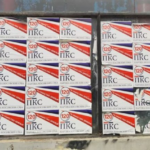his report explores how armed groups gain or lose become less necessary in shaping community behaviours
that facilitate armed group operations.
This report is the fourth in the ‘Non-state armed groups and illicit economies in West Africa’ series, a collaboration between the Armed Conflict Location and Event Data (ACLED) project and the Global Initiative Against Transnational Organized Crime (GI-TOC).1 Earlier reports provided in-depth case studies of three different armed groups operating in West and Central Africa. First among these was a report on Jama’at Nusrat al-Islam wal-Muslimin (JNIM), a violent extremist group currently operating across swathes of Mali, Burkina Faso, to a lesser extent Niger, and increasingly in the northern areas of some coastal states, including Benin and Togo. The second report looked at the constellation of armed bandit groups currently operating in Nigeria’s North West region, which have transformed the region into a hotspot of intense violence in the country, exceeding other regions plagued by violence primarily from violent extremist and separatist groups.2 The third report considered the Anglophone separatist groups that have been operating in Anglophone regions of Cameroon since 2017, when they unilaterally declared the secession of the territory from the Francophone state in Yaoundé and the formation of a separate Ambazonian state.
Each case study considered the structure of the armed groups, how they draw revenue and operational resources from illicit and licit economies, and the groups’ activities. The case stud- ies explored how different groups exert forms of ‘governance’, understood for the purposes of this series as attempts by an armed group to establish itself as a governing authority in local areas through the regulation of residents’ behaviour, service provision and the control of local finances and economies.3
While the case studies in this series focused on a specific armed group as the unit of analysis, this report focuses on the crosscutting theme of legitimacy and the characteristics of spaces – and illicit economies prevalent within them – that facilitate legitimacy gain.
legitimacy among communities in territories over which they have influence through their engagement with illicit and licit economies. It emphasizes the importance of spaces in which armed groups’ goals of revenue generation, obtaining operational resources and building legitimacy align. These spaces often develop where illicit economies fulfil the needs of resident communities, where the state criminalizes livelihoods that residents see as legitimate and where illicit economies offer revenue or resources to armed groups. Such spaces are thus particularly valuable to armed groups and dangerous to states as armed groups derive significant benefits from their operations in these spaces and become harder todislodge. This report highlights two such spaces – artisanal gold mining sites and national parks – that are key to consider for stakeholders’ analyses and designing interventions to disrupt armed group embeddedness in West Africa.


